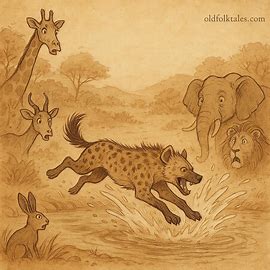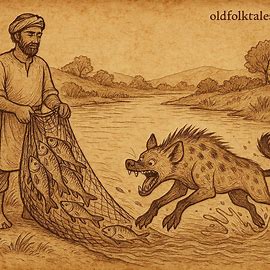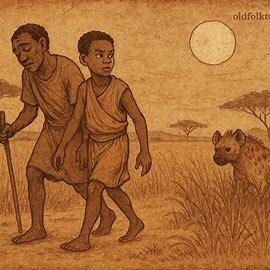Long ago, in the wide bushlands of Burkina Faso where acacia trees lean toward the sun and the ponds glimmer under the dry-season sky, the animals of the wild gathered for an important decision. They had lived many seasons without a spiritual leader, and it was agreed that the time had come to choose an imam. The imam would not only guide their prayers but also represent wisdom, knowledge, and leadership among all creatures.
But how could they decide who deserved such an honored role? After much debate, they agreed on a test. The animal who proved to be the cleverest would earn the title. To measure cleverness, they proposed a simple contest: each would draw water from the pond, wash himself thoroughly, and recite verses from the Qur’an. The one who finished washing first and displayed the greatest composure would be chosen.
At once, the animals hurried to fetch their kettles. One by one, they filled their containers with water and began to scrub themselves vigorously at the pond’s edge. Dust and sweat gave way to splashing, as gazelle, antelope, and even the patient tortoise tried their best to be quick and thorough. The air buzzed with excitement and tension, each beast determined to prove himself worthy of the imam’s robe.
All of them, that is, except one.
The Hyena Waits
Off to the side sat the hyena. He did not fetch a kettle, nor did he hurry into the water. He simply rested on his haunches at the edge of the pond, his sharp eyes watching the others scramble and scrub. His silence drew attention.
READ THIS: The Rooster and the Elephant: A Mossi Folktale That Teaches Lessons on Courage and Cunning
“Hyena,” the animals called out between splashes, “do you not want to become imam like the rest of us?”
But the hyena gave no answer. He remained still, his ears twitching slightly, his expression unreadable. Some laughed at him, thinking he was lazy. Others ignored him, too busy scrubbing themselves to care.
At last, after a long while, each of the animals finished washing. They shook out their coats, preened, and lined up neatly, ready for the next stage: the recitation of Qur’anic verses. The competition was close, and no one could say who might be declared victor.
That was when the hyena made his move.
The Clever Trick
With sudden energy, the hyena leapt straight into the pond. Water splashed high into the air as he rolled and soaked himself from head to tail. Then, standing boldly in the center of the pool, he cried out in a strong voice:
“Allahu akbar! You washed your feet and your hands, you dried your ears, and you scrubbed your heads. But I, look at me!, I have washed my whole self at once. Between the one who washed himself completely and those who washed only in parts, who has truly finished first?”
The animals were stunned. His words were sharp and his reasoning undeniable. By jumping in and washing himself all over in one stroke, the hyena had indeed outsmarted their method. They had busied themselves with details, while he had seized victory through wit.
After murmurs and nods of agreement, the decision was unanimous: the hyena would be named imam.
The Imam’s Power
From that day on, the hyena carried himself with the dignity of an imam. When he left the bush for the village, he recited verses from the Qur’an as he went, his voice rising with authority. There was a power in his words, one so strong that people seemed unable to resist him.
It is said that if you sit in a group and the hyena approaches, he may recite verses as he passes by. Without asking, he can take what he wants, even food from right under your nose, and return the way he came. And no one dares to challenge him. This authority, the tale tells us, was granted to him on the very day he became imam.
Moral Lesson
This Mossi folktale teaches that cleverness and strategy can often outweigh raw effort or speed. While the other animals hurried and exhausted themselves in washing carefully, the hyena paused, observed, and chose the moment to act with wit. His cunning solution won him the honor all others desired.
The tale also reminds us of the weight of authority. Leadership gained through cleverness grants power, but it must be used with responsibility. The hyena’s ability to take what he wants without resistance warns us that wit without wisdom can lead to exploitation. True leadership should balance intelligence with justice.
Knowledge Check
Q1. What important decision were the animals making in the story?
A1. They were electing an imam to lead them in prayer and wisdom.
Q2. What contest was chosen to decide who would become imam?
A2. Each animal had to wash himself at the pond and then recite Qur’anic verses.
Q3. How did the hyena behave while the other animals were washing?
A3. He sat calmly by the pond, watching silently without joining in.
Q4. What clever action did the hyena take to win?
A4. He leapt into the pond, washed himself all at once, and argued that he finished before the others.
Q5. What special power did the hyena gain after being named imam?
A5. He could recite Qur’anic verses, take whatever he wanted openly, and leave without being stopped.
Q6. What key lesson does this folktale teach?
A6. That cleverness and timing can surpass effort, but leadership requires responsibility and fairness.
Source: Mossi folktale, Burkina Faso.






